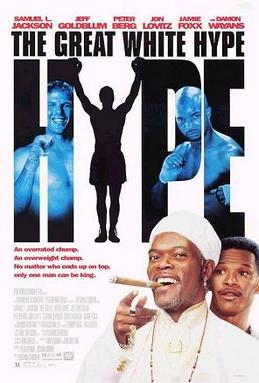The Great White Hype (1996)
The Great White Hype is a 1996 American sports comedy movies directed by Reginald Hudlin. The movie is a satire of Larry Holmes' 1982 fight with Gerry Cooney (who was known as "The Great White Hope") and Mike Tyson's 1995 return fight vs. Peter McNeeley.[1]
Summary
At the point when the champ's advertiser, Reverend Sultan, chooses something new is expected to help the attractiveness boxing matches, he searches and finds the solitary man to beat the champ. The issue is that he is no longer a boxer and he's white. Nonetheless, when Reverend Sultan persuades him to battle, he goes into hefty preparing, while the sure champ relaxes, and drops flabby.[2]
Controversy
The movie contains a lot of racial and ethnic slurs a comedy where white people insult black people and vice versa. There are also people insulting others by their own race.
Racial and ethnic slurs fly everywhere in Reginald Hudlin's scattershot comedy, with whites insulting blacks, blacks insulting whites, and even people insulting others of their own race, but the insults are so even-handed they wind up cathartic rather than rude. With a joyous content by Tony Hendra and Ron Shelton, also a gamely interesting cast, this unruly film approaches the thing it's pursuing: conveying a race-cognizant "Spinal Tap" for the universe of sports. [3]
The champ in the movie has a bar attitude towards sport. He is a lazy person who does not train and use racially motivated tape to bring himself up into the fighting rage. [4]
There is also many racial slurs, some also given by black person to another black person, here is some of the dialogue :
Rev. Fred Sultan: if there isn't a white heavyweight out there for you, I'm going to create you one.
James Roper: [Confused] "white heavyweight?", The words don't even go together, it's like saying "black unity"
James Roper: Hey, we ain't duckin' you man. You're just so black we can't find you!
James Roper: I'll beat him with my blackness.
(Hudlin, 1996)
